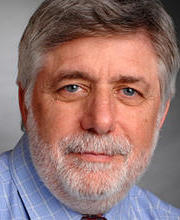Jerome Ritz, M.D.
Brigham and Women's Hospital
Harvard Medical School

The Ritz lab seeks to distinguish graft-versus-leukemia (GVL) response from graft-versus-host disease (GVHD) and to develop new methods for selectively enhancing GVL.
Allogeneic hematopoietic stem cell transplantation (HSCT) is widely used in the treatment of patients with hematologic malignancies, but continues to be associated with severe toxicities. Both the effectiveness and toxicity of HSCT are mediated by donor T-cells in the stem cell graft. Those T cells that target antigens expressed on recipient leukemia cells play an important role in eradicating residual tumor cells and preventing leukemia relapse after transplant. In contrast, T cells that target antigens expressed by normal tissues in the recipient are the primary mediators of graft versus host disease (GVHD) and thus lead to substantial toxicities.
The Ritz laboratory focuses on the assessment of donor immune function after HSCT and characterization of the immune mechanisms responsible for graft versus leukemia (GVL) and GVHD.
Although donor T cells are thought to be the primary cells responsible for GVL and GVHD, studies from the Ritz laboratory provided evidence that donor B cells also play a role in both of these immunologic effects. To examine the role of B cells they determined whether patients developed antibodies specific for minor histocompatibility antigens such as Y-chromosome encoded proteins (H-Y antigens) after HSCT.
While males are tolerant to these self-proteins, female immune cells can develop strong responses to these antigens after transplantation into male recipients. Ritz's studies demonstrated that antibodies specific for H-Y antigens were present in approximately 50% of male recipients with female donors but not in male patients with male donors. H-Y antibodies were not present before transplant but developed 4-8 months after HSCT. Importantly, the incidence of chronic GVHD was significantly higher in patients with H-Y antibodies, but the risk of relapse was also lower in these patients.
These studies provided evidence that B cell immune responses contribute to GVHD as well as GVL after HSCT. They suggested that agents such as rituximab, that target donor B cells, might offer a new therapeutic approach for chronic GVHD. This was confirmed by clinical trials demonstrating the efficacy of rituximab in patients with persistent chronic GVHD despite other immune suppressive treatments.
Further studies evaluating the efficacy of rituximab for prevention of chronic GVHD are also underway.
The group has also focused on the role of regulatory T cells (Treg) after HSCT. Treg are known to play a critical role in immune tolerance and deficiencies of Treg contribute to the development of autoimmune diseases. Studies from the Ritz lab showed that patients with chronic GVHD were deficient in Treg and the inability to reconstitute normal numbers of Treg after transplant helps explain the inability of some patients to become tolerant to their own tissues. These findings also suggested that enhancement of Treg might restore immune tolerance and control GVHD. This was confirmed in clinical trials showing that administration of low doses of IL-2, a critical cytokine required for maintenance of Treg, resulted in the selective expansion of Treg and significant clinical improvement in approximately 50% of patients with active chronic GVHD.
Biosketch
Dr. Ritz is Executive Director of the Connell-O'Reilly Cell Manipulation Core Facility (CMCF) and a Professor of Medicine at Harvard Medical School. The CMCF provides hematopoietic stem cells for patients who are undergoing hematopoietic stem cell transplantation and manufactured cellular products of various types for patients enrolled on clinical trials evaluating novel cellular therapies for cancer. Dr. Ritz is a member of the Executive Committee of the Dana-Farber/Harvard Cancer Center and the Associate Director for Core Facilities at DF/HCC. He is a Co-Director of the Cancer Vaccine Center at the Dana-Farber Cancer Institute and a member of the Executive Committee of the Harvard Stem Cell Institute. Dr. Ritz's current laboratory research focuses on immune reconstitution after hematopoietic stem cell transplantation, cellular therapies and immunotherapy of cancer.
A graduate of Northwestern University, Dr. Ritz received his M.D. from Chicago Medical School in 1972, followed by a residency in internal medicine at the University of Wisconsin Hospital, Madison. Dr. Ritz completed a clinical fellowship in Hematology and Oncology at Beth Israel Hospital and a research fellowship at the Dana-Farber Cancer Institute, where he joined the staff in 1980. Dr. Ritz was a Scholar of the Leukemia Society of America and is a recipient of the prestigious Stohlman Scholar Award. He is an expert in hematologic malignancies, bone marrow transplantation and cancer immunology.
